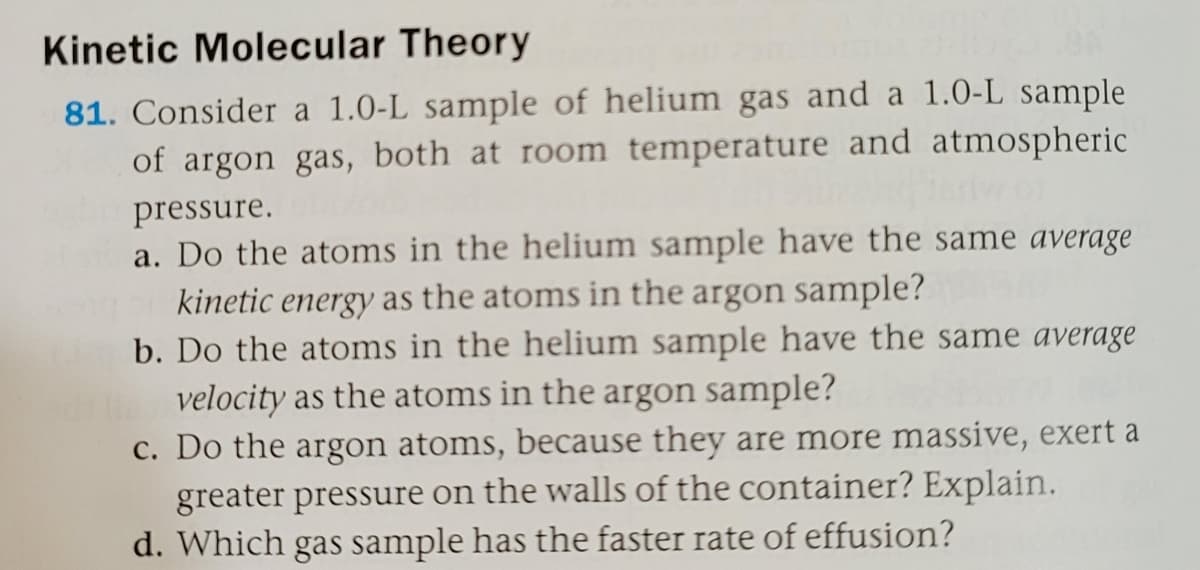81. Consider a 1.0-L sample of helium gas and a 1.0-L sample of argon gas, both at room temperature and atmospheric pressure. a. Do the atoms in the helium sample have the same average kinetic energy as the atoms in the argon sample? b. Do the atoms in the helium sample have the same average velocity as the atoms in the argon sample? c. Do the argon atoms, because they are more massive, exert a greater pressure on the walls of the container? Explain. d. Which gas sample has the faster rate of effusion?
81. Consider a 1.0-L sample of helium gas and a 1.0-L sample of argon gas, both at room temperature and atmospheric pressure. a. Do the atoms in the helium sample have the same average kinetic energy as the atoms in the argon sample? b. Do the atoms in the helium sample have the same average velocity as the atoms in the argon sample? c. Do the argon atoms, because they are more massive, exert a greater pressure on the walls of the container? Explain. d. Which gas sample has the faster rate of effusion?
Chemistry by OpenStax (2015-05-04)
1st Edition
ISBN:9781938168390
Author:Klaus Theopold, Richard H Langley, Paul Flowers, William R. Robinson, Mark Blaser
Publisher:Klaus Theopold, Richard H Langley, Paul Flowers, William R. Robinson, Mark Blaser
Chapter5: Thermochemistry
Section: Chapter Questions
Problem 28E: The reaction of 50 mL of acid and 50 mL of base described in Example 5.5 increased the temperature...
Related questions
Question
#81
Please solve on a sheet of paper.

Transcribed Image Text:Kinetic Molecular Theory
81. Consider a 1.0-L sample of helium gas and a 1.0-L sample
of argon gas, both at room temperature and atmospheric
pressure.
a. Do the atoms in the helium sample have the same average
kinetic energy as the atoms in the argon sample?
b. Do the atoms in the helium sample have the same average
velocity as the atoms in the argon sample?
c. Do the argon atoms, because they are more massive, exert a
greater pressure on the walls of the container? Explain.
d. Which gas sample has the faster rate of effusion?
Expert Solution
This question has been solved!
Explore an expertly crafted, step-by-step solution for a thorough understanding of key concepts.
This is a popular solution!
Trending now
This is a popular solution!
Step by step
Solved in 2 steps with 2 images

Recommended textbooks for you

Chemistry by OpenStax (2015-05-04)
Chemistry
ISBN:
9781938168390
Author:
Klaus Theopold, Richard H Langley, Paul Flowers, William R. Robinson, Mark Blaser
Publisher:
OpenStax


Chemistry
Chemistry
ISBN:
9781305957404
Author:
Steven S. Zumdahl, Susan A. Zumdahl, Donald J. DeCoste
Publisher:
Cengage Learning

Chemistry by OpenStax (2015-05-04)
Chemistry
ISBN:
9781938168390
Author:
Klaus Theopold, Richard H Langley, Paul Flowers, William R. Robinson, Mark Blaser
Publisher:
OpenStax


Chemistry
Chemistry
ISBN:
9781305957404
Author:
Steven S. Zumdahl, Susan A. Zumdahl, Donald J. DeCoste
Publisher:
Cengage Learning

Chemistry & Chemical Reactivity
Chemistry
ISBN:
9781133949640
Author:
John C. Kotz, Paul M. Treichel, John Townsend, David Treichel
Publisher:
Cengage Learning

Chemistry & Chemical Reactivity
Chemistry
ISBN:
9781337399074
Author:
John C. Kotz, Paul M. Treichel, John Townsend, David Treichel
Publisher:
Cengage Learning

Chemistry: Principles and Reactions
Chemistry
ISBN:
9781305079373
Author:
William L. Masterton, Cecile N. Hurley
Publisher:
Cengage Learning